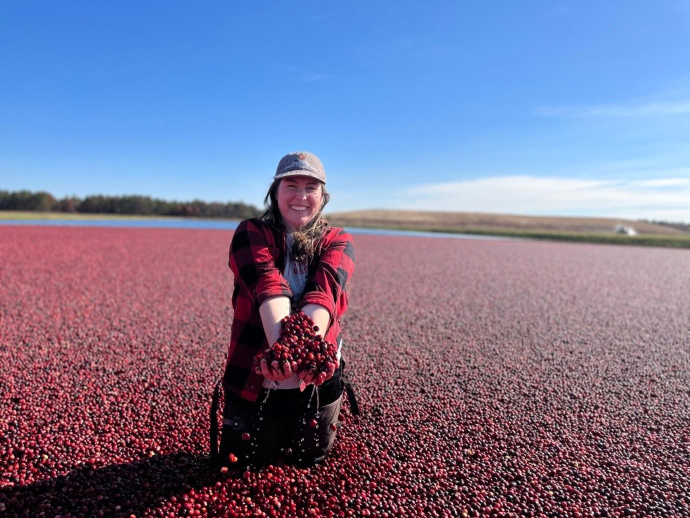
In our Team Spotlight Series, we want to introduce you to the team members who help make VacCAP possible through their passion and hard work. In this segment, get to know Dr. Jenyne Loarca, a Principal Investigator (AFRI NIFA Postdoctoral Fellowship) at the University of Wisconsin-Madison with advisors Dr. Juan Zalapa & Dr. Amaya Atucha.
What is the project you’re working on for VacCAP about?
I wrote and was awarded an AFRI-NIFA fellowship grant to explore genetic and phenotypic diversity for fruit quality traits in a large cranberry diversity panel. After our diversity panel here in Wisconsin failed to produce fruit, I pivoted towards collaborating with our colleagues at the P.E. Marucci Center for Blueberry and Cranberry Research to evaluate their diversity panel. In addition to characterizing this germplasm for traits that are important for consumers and processors, including sugars, acids, firmness, texture, internal structure, and cell wall integrity, I plan to to perform a genome-wide association study (GWAS) to identify major QTL associated with these traits, with the long-term goal of identifying excellent breeding parents and facilitating marker-assisted breeding efforts. My project also involves travelling into the wild to collect cranberry propagules from remote bogs in the Appalachian Mountains and in Alaska. These wild cranberries are genetically diverse and can be used to study unique traits that evolved to promote their survival in these unique environments.
What is something you like or find most interesting about your work?
I have really enjoyed working with cranberry stakeholders in industry to learn about their needs. The more we communicate and learn, the more specific and relevant the research questions I can ask, and I can then design experiments that address those needs. For example, I visited the Ocean Spray HQ in March 2023 and learned about some important traits that would improve processing efficiency. Luckily, I saved remnant fruit from my Fall 2022 harvest, and I collaborated with the Atucha lab to design an experiment to assay the diversity panel for these traits and analyze the data as part of the planned pipeline.
What do you hope to do in the future after your work here?
I think often about the lack of biodiversity in the global food system. As climate change ramps up, crop scientists are asking whether the few crops that we grow will still be growable in the future. People in the Global South are particularly vulnerable and agricultural research plays an important role in reducing poverty and hunger. What solutions could there be if the crops we currently grow become ungrowable due to climate change? Should we study more diverse crops and attempt to improve them through plant breeding? What crops have the most potential for change and adaptability? Do we need to change the way we grow, store, and distribute our foods? Which issues can be solved with plant breeding and which require systemic change within a social system? These are the kinds of questions asked by scientists concerned about food security and sustainability.
Anything else you would like to add?
Here’s a photo of me in October 2022 visiting Cranberry Creek – the largest producer and processor of cranberries in the U.S.!













